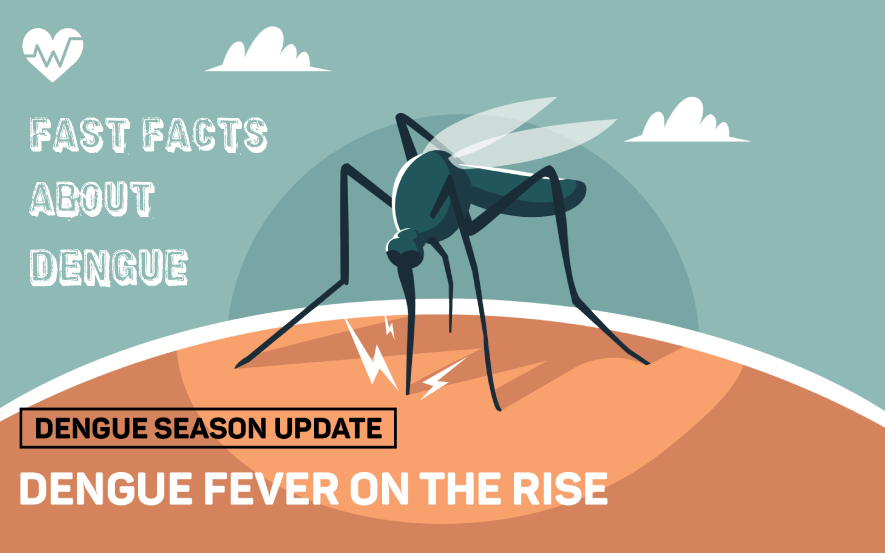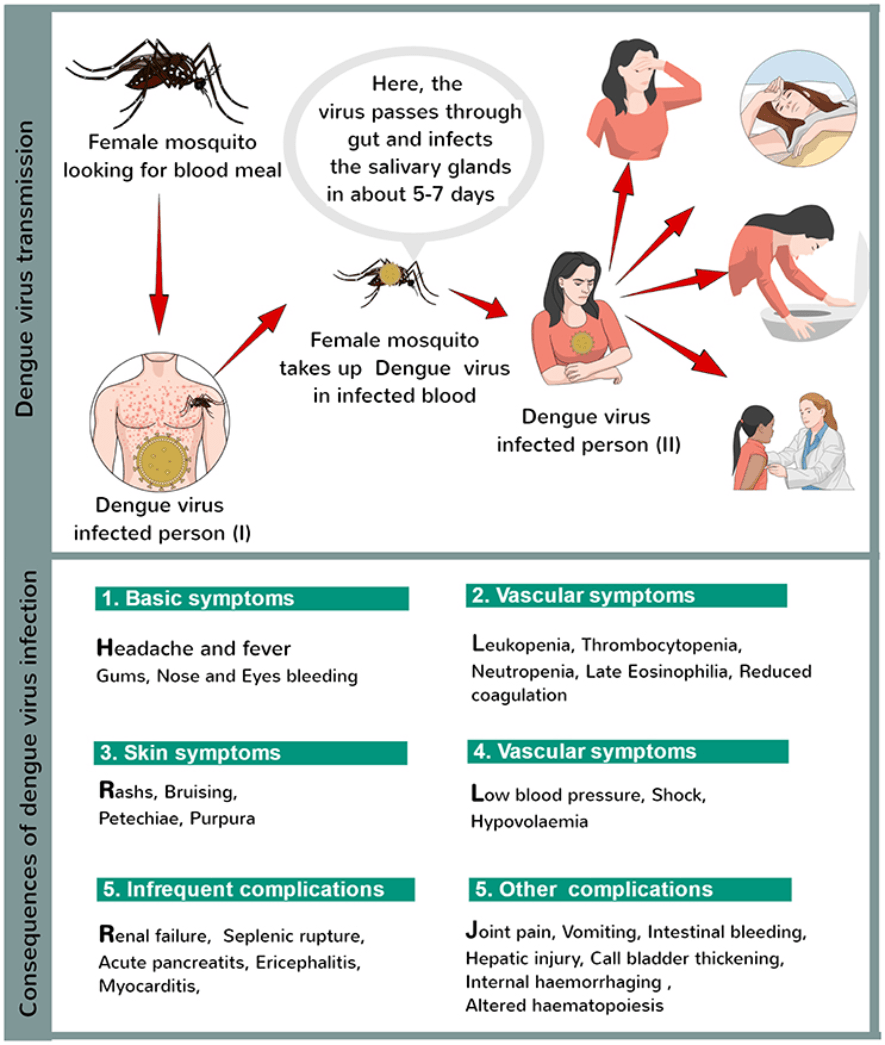
Facts about Dengue Fever
- Dengue is a type of fever caused by viruses transmitted through Aedes mosquitoes.
- Common dengue fever symptoms include muscle or joint pain, headache, swollen lymph nodes, fever, rash, and exhaustion.
- Treatment of dengue fever is symptomatic. A virus causes dengue fever, so there is no specific medicine or antibiotic to treat it.
- A virus that causes dengue fever is prevalent throughout tropics and subtropics.
- Papaya leaf extracts help treat dengue fever.
- A phase of illness and muscle pain due to dengue typically lasts for about one to two weeks.
- Dengue hemorrhagic fever (DHF) is a syndrome that affects children below ten years of age.
- Dengue fever prevention includes the control and eradication of mosquitoes that carry the dengue virus.
- FDA (Food & Drug Administration) approved a dengue vaccine, Dengvaxia, in May 2019 for dengue-endemic areas in the USA.
What is Dengue Fever? How is it caused?
Dengue is a condition caused by viruses transmitted through infected mosquitoes. Dengue fever is an acute illness that follows symptoms such as headache, exhaustion, fever, joint or muscle pain, swollen lymph nodes, and skin rashes.
The most common characteristics of dengue fever are the presence of fever, headache, and itchy rashes. Other signs of dengue are bleeding gums, red palms, severe pain behind eyes, redness of soles, and others.
Dengue fever can affect anyone, but it is mostly found in people with a weak immune system. Only one of the five stereotypes of the dengue virus causes the illness, as a result, a person may get dengue fever several times.
Dengue fever is famous for other names such as “dandy fever” or “breakbone fever.” It got its name breakbone fever because affected people have contortions because of severe joint, muscle, and bone pain.
A fatal form of dengue fever is dengue hemorrhagic fever (DHF). Symptoms of DHF include fever, headache, skin rashes, evidence of bleeding in the body, small red spots or blisters under the skin (petechiae), bleeding in gums or nose, easy bruising, or black stools. This form of dengue fever is life-threatening and can lead to dengue shock syndrome.
How Long Does it Last?
Fever and muscle pain (myalgia) lasts for about one to two weeks. The acute phase of dengue fever generally does not exceed that duration. However, a feeling of weakness and fatigue and full recovery may take several weeks or more.
Is Dengue Fever Contagious?
Dengue virus is not contagious as it cannot spread person to person. A common pathway can be person-to-mosquito-to-another-person, as it is a mosquito-borne disease. A mosquito biting a dengue infected person can transmit the illness by getting the virus by an infected person and then transferring it to some other person.
The life cycle of the dengue virus draws in Aedes mosquito as transmitter and humans as a source of infection.
To avoid contracting dengue fever, try to avoid mosquitoes. Wear light-colored long sleeves shirts or uppers and full-length pants or lowers in the dengue-endemic areas. Use insect repellants, sleep indoor, and stay in clean places.
Incubation Period of Dengue Fever:
The incubation period of dengue fever is about 3 to 15 days after being bitten by a virus-carrying mosquito.
Signs and Symptoms of Dengue Fever:
Dengue fever starts with flu-like symptoms such as headache, chills, pain in eyes, loss of appetite, low backache, and feeling unwell (malaise). Pain in joints and legs occurs during the first few hours of illness. The temperature hikes as high as 104 F. Relatively low blood pressure, low heart rate, red eyes, pale pink rash, and swollen lymph nodes of neck and groin are some more signs and symptoms of dengue fever.
High fever and other symptoms last for up to 2-4 days, followed by profuse sweating and a rapid drop in body temperature. Then a day of well-being and average body temperature precedes. The next day marks a second rapid rise in body temperature. Then an itchy rash, small red spots, appear and spreads to cover the entire body except for the face. The soles and palms may be swollen and bright red.
Tests to Diagnose Dengue Fever:
Medicals professionals diagnose dengue fever infection if a patient exhibits typical clinical signs and symptoms of headache, eye pain, high fever, severe muscle pain, petechial rash, and sometimes a history of living or visiting a dengue-endemic area.
It is hard to diagnose dengue fever as its symptoms are the same as many other tropical diseases and viral illnesses.
Doctors may use a blood test called DENV Detect IgM Capture ELISA to detect dengue fever. However, the FDA says that this test may give a positive result if a person has a closely related virus disease such as West Nile Disease.
How to Treat Dengue Fever?
There are no antibiotics to treat dengue fever as a virus causes it. Antiviral medications are also not recommendable for its treatment. Typical dengue treatment consists of relief from its signs and symptoms. Several home remedies like rest and oral rehydration (fluid intake) are essential. Take pain medications only on prescription as they can worsen bleeding problems. Aspirin and nonsteroidal anti-inflammatory drugs (NSAIDs) are helpful as pain relievers in this condition. For severe headache and muscle and joint pain, doctors may prescribe acetaminophen (Tylenol) and codeine.
Patients hospitalized for dengue receive IV fluids.
Many types of research proved that an effective treatment for dengue fever is Carica papaya leaf extract of papaya leaf.


You guys are really awesome.